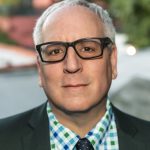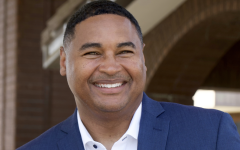
Downtown Los Angeles (Photo: Evan Symon for the California Globe)
Los Angeles DA Q&A, Part Four: On Strikes and Reform
‘The community expects that individuals who commit serious and violent crimes should be punished and removed from society for an appropriate period of time’
By Thomas Buckley, February 5, 2024 11:41 am
This is part four of a continuing series of questions and answers with the candidates for Los Angeles District Attorney.
California has a “three strikes” law. That should mean that if you do three very bad things you can go to prison for a very long time.
Los Angeles County District Attorney George Gascon is a decarcerationist, meaning he really doesn’t think people should be in prison – in fact, his preferred maximum sentence for pretty much anything would be 15 years.
In other words, he’s not a fan of strikes and has strongly discouraged their use in his office (he got sued for that position and lost.)
Gascon is also in favor of gun control, except, it seems, for people who use guns to commit crimes as he does not allow the addition of “gun enhancements” to prosecutions. Go figure.
Gascon is also a “criminal justice reformer.” To him that means the system is inherently corrupt and racist and bad and should be practically gutted and re-built(ish.) But reform can mean something far less insanely dangerous, too.
Let’s get to today’s questions:
Will you allow the use of “strikes” and enhancements?

The law requires that we allege applicable strike offenses to a criminal complaint. Whether to apply the strike punishment to a sentence should be determined on a case-by-case basis that considers the seriousness of the conduct, the impact on the victim, the offender’s criminal history and other social factors related to the offense. Similarly, enhancements should be applied fairly and equally and when appropriate based on the facts of the case and other relevant factors. Prosecutors should have the discretion to apply the laws the legislature has given us to keep the public safe.
DAVID MILTON
 Mr. Gascon’s refusal to follow the law, thereby usurping the authority of the legislative and judicial branches, has resulted in a miscarriage of justice in many cases. His stubborn refusal to follow the law due to his personal agenda is one factor that prompted me to seek election to the office.
Mr. Gascon’s refusal to follow the law, thereby usurping the authority of the legislative and judicial branches, has resulted in a miscarriage of justice in many cases. His stubborn refusal to follow the law due to his personal agenda is one factor that prompted me to seek election to the office.
NATHAN HOCHMAN

I was proud to be part of the team that successfully sued George Gascón to ensure he enforced the “Three Strikes” law. It is the law overwhelmingly approved by the voters and the state legislature in 1994; it has survived numerous challenges since; and it targets the worst of the worst offenders providing them with a serious disincentive to continuing a life that victimizes residents of our county. If the evidence warrants a Three Strikes prosecution or other enhancements, such a prosecution will be brought under my administration.
DEBRA ARCHULETA

Unlike the current DA, I will emphatically employ the use of strikes in cases where the accused is a repeat serious and/or violent felon. However, these filing decisions will be made on a case-by-case basis. Weapons enhancements will be filed in every case deemed appropriate by the filing DA, which would penalize criminals who use a gun during the commission of a serious and violent crime. California has some of the strictest gun control laws on the books, however, Gascón refuses to properly prosecute those who use guns in an unlawful way. I will not allow the use of blanket policies to prevent Deputy District Attorneys from pursuing the appropriate filing, bail, and sentencing decisions in each case.
DANIEL KAPELOVITZ

Three Strikes has been a disaster. People – disproportionately nonwhites – spend decades more than necessary to achieve the goals of incarceration. The maximum sentences for crimes are high enough already – and prior convictions have always been considered in terms of plea deals and sentencing. Every case is different, but we also must ensure that people are treated equally.
Enhancements can more than double a sentence. I had a case where my client rejected an 8-year offer. The maximum sentence without enhancements was 12 years. To punish this African-American man for exercising his right to go to trial, the judge maxed him out and gave him 29 years in prison, where he died from Covid.
Most enhancement laws were enacted when politicians were fighting to be the most “Law and Order” candidate. People have since wised up, but it takes time for the laws to catch up with reality.
Criminal justice reform seems to mean different things to different people, though the ideas of systemic race-based inequality and over-incarceration appear to be at the forefront currently. Do you see the justice system as inherently racist and what is your position on incarceration as a tool to promote public safety?
MARIA RAMIREZ
The justice system is not inherently racist. However, we must be mindful that criminal justice policies may disproportionately affect communities of color more significantly than others. The fundamental mission of the DA is to try and achieve justice for the victim of a criminal case and to hold the defendant accountable for his or her wrongdoing. That accountability can have varying results, again depending on the unique circumstances of each case and each defendant. While incarceration should never be the only option for punishment, incarceration serves as an important tool to address the criminal offenders that pose a significant risk to the public. The community expects that individuals who commit serious and violent crimes should be punished and removed from society for an appropriate period of time.
DAVID MILTON
I grew up in the State of Indiana during the 60’s and 70’s and suffered the indignities of a racially intense environment. I am sensitive to racial inequities. My experience as a judge and prosecutor has caused me to conclude that the term “systemic racism, “race-based inequity” and “over-incarceration” are terms that were created as a divisive tool to advance certain narratives.
While one may be able to point to anecdotal instances where race led to a decision, in my view it is not systemic. Cases are filed based on the strength of the evidence. Sentences are imposed based on the facts, egregiousness of the crime, helplessness of the victim, and prior criminal history of the perpetrator.
NATHAN HOCHMAN
There’s no question that ethnic minorities make up a disproportionate percentage of people caught up in the criminal justice system. We can and must do better. But the solution is not to simply stop enforcing the law, as Gascon has done. True threats to our public safety must be incarcerated, but we must find options other than incarceration for first-time, non-violent offenders. I am a strong advocate of diversion programs, where low-level offenders can receive counseling and other tools to help them turn their lives in the right direction. Our prisons must be more than warehouses; they need to be training grounds where incarcerated people develop job skills that give them a real opportunity to succeed after they are released. For example, I believe in the mission of The Last Mile, www.thelastmile.org, a nonprofit that teaches coding to incarcerated persons who leave prison with new skills that can translate into quality jobs.
DEBRA ARCHULETA
I am keenly aware that criminal justice reform is both necessary and appropriate after 35 years in a courtroom. There is clear evidence of systemic, race-based inequality throughout the criminal justice system, and I do believe we have made some progress towards righting these wrongs over the last couple of decades. I am concerned that many of the repeat offenders who commit serious and violent crimes with impunity prey primarily upon communities of color, yet do not face meaningful consequences. As District Attorney, I will provide the same level of service across LA County without regard for the race or socioeconomic status of any particular community. The LA County District Attorney’s office is the largest in the country and must demonstrate appropriate leadership to ensure that all communities feel they are receiving equal access and treatment throughout the pursuit of justice.
Incarceration can be an effective tool in promoting public safety by removing the most serious and violent offenders from the community. But, when people leave prison, they often end up homeless and unemployed. We need stronger re-entry and job-training programs to better integrate formerly-incarcerated people back into society so they may become stable, healthy, and productive citizens.
DANIEL KAPELOVITZ
There is no doubt that the “justice” system is inherently racist and discriminates against the poor.
People in prison are disproportionately people of color. People of color are stopped more often by police, searched more often, arrested more often, charged more often, and given extremely high sentences more often than so-called white people. Defenders of this practice claim that people of color commit more crimes than white people. Even assuming that was true for the sake of argument, doesn’t that say more about society than it does about the people who commit crimes?
The following candidates did not participate: Eric Siddall, John McKinney, Jon Hatami, Jeff Chemerinsky, and Craig Mitchell.
As to George Gascon, he was asked different but related questions:
Why are you opposed to strikes and enhancements and is your staunch anti-gun rhetoric not undermined by your refusal to punish people who actually use them in the commission in a crime?
Criminal justice reform seems to mean different things to different people, though the ideas of systemic race-based inequality and over-incarceration appear to be at the forefront currently. Do you see the justice system as inherently racist and what is your position on incarceration as a tool to promote public safety?
Again, he did not reply to the request.
- Benefit Fraud Problems and Solutions - November 7, 2024
- A Little Exit Poll - November 5, 2024
- Tomorrow’s Headlines Today! - November 5, 2024





With regards to the candidate’s responses about systemic race-based inequality and over-incarceration, David Milton sounds like the best DA candidate with his answer that he grew up in a racially intense environment and that his experience as a judge and prosecutor has caused him to conclude that the term “systemic racism, “race-based inequity” and “over-incarceration” are terms that were created as a divisive tool to advance certain narratives. He further added that cases are filed based on the strength of the evidence and that sentences are imposed based on the facts, egregiousness of the crime, helplessness of the victim, and prior criminal history of the perpetrator.
All of the other candidates sounded like pandering liberal lawyers? Especially disappointing were the generalizations from Debra Archuleta who claimed that there is a “clear evidence of systemic, race-based inequality throughout the criminal justice system” and Daniel Kapelovitz who claimed that the “justice” system is inherently racist and discriminates against the poor without citing any evidence? While Maria Ramirez said that the justice system is not inherently racist, she contradicted herself when she claimed that criminal justice policies may disproportionately affect communities of color more significantly than others? What exactly are communities of colors that she is referring to?